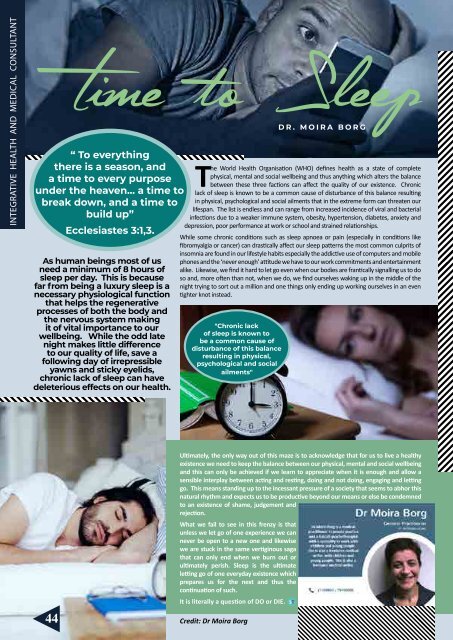ST_F_BRIAN
Create successful ePaper yourself
Turn your PDF publications into a flip-book with our unique Google optimized e-Paper software.
INTEGRATIVE HEALTH AND MEDICAL CONSULTANT<br />
Time to Sleep<br />
DR. MOIRA BORG<br />
“ To everything<br />
there is a season, and<br />
a time to every purpose<br />
under the heaven... a time to<br />
break down, and a time to<br />
build up”<br />
Ecclesiastes 3:1,3.<br />
As human beings most of us<br />
need a minimum of 8 hours of<br />
sleep per day. This is because<br />
far from being a luxury sleep is a<br />
necessary physiological function<br />
that helps the regenerative<br />
processes of both the body and<br />
the nervous system making<br />
it of vital importance to our<br />
wellbeing. While the odd late<br />
night makes little difference<br />
to our quality of life, save a<br />
following day of irrepressible<br />
yawns and sticky eyelids,<br />
chronic lack of sleep can have<br />
deleterious effects on our health.<br />
The World Health Organisation (WHO) defines health as a state of complete<br />
physical, mental and social wellbeing and thus anything which alters the balance<br />
between these three factions can affect the quality of our existence. Chronic<br />
lack of sleep is known to be a common cause of disturbance of this balance resulting<br />
in physical, psychological and social ailments that in the extreme form can threaten our<br />
lifespan. The list is endless and can range from increased incidence of viral and bacterial<br />
infections due to a weaker immune system, obesity, hypertension, diabetes, anxiety and<br />
depression, poor performance at work or school and strained relationships.<br />
While some chronic conditions such as sleep apnoea or pain (especially in conditions like<br />
fibromyalgia or cancer) can drastically affect our sleep patterns the most common culprits of<br />
insomnia are found in our lifestyle habits especially the addictive use of computers and mobile<br />
phones and the ‘never enough’ attitude we have to our work commitments and entertainment<br />
alike. Likewise, we find it hard to let go even when our bodies are frantically signalling us to do<br />
so and, more often than not, when we do, we find ourselves waking up in the middle of the<br />
night trying to sort out a million and one things only ending up working ourselves in an even<br />
tighter knot instead.<br />
"Chronic lack<br />
of sleep is known to<br />
be a common cause of<br />
disturbance of this balance<br />
resulting in physical,<br />
psychological and social<br />
ailments"<br />
44<br />
Ultimately, the only way out of this maze is to acknowledge that for us to live a healthy<br />
existence we need to keep the balance between our physical, mental and social wellbeing<br />
and this can only be achieved if we learn to appreciate when it is enough and allow a<br />
sensible interplay between acting and resting, doing and not doing, engaging and letting<br />
go. This means standing up to the incessant pressure of a society that seems to abhor this<br />
natural rhythm and expects us to be productive beyond our means or else be condemned<br />
to an existence of shame, judgement and<br />
rejection.<br />
What we fail to see in this frenzy is that<br />
unless we let go of one experience we can<br />
never be open to a new one and likewise<br />
we are stuck in the same vertiginous saga<br />
that can only end when we burn out or<br />
ultimately perish. Sleep is the ultimate<br />
letting go of one everyday existence which<br />
prepares us for the next and thus the<br />
continuation of such.<br />
It is literally a question of DO or DIE. <strong>ST</strong><br />
Credit: Dr Moira Borg

















